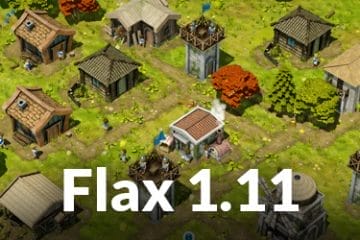Over the last years, Game Jams have become a great way to gain game development experience, meet other developers and most importantly have fun.
Don’t have a game jam in your area? No problem. With this simple guide you can organise your own jam in no time.
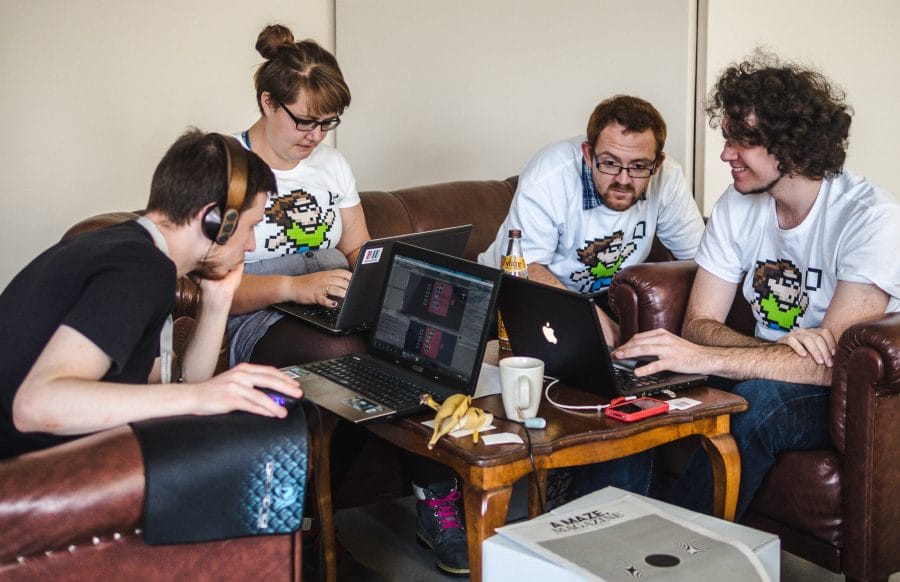
What is this “Game Jam” you’re talking about?
Simply put, a game jam is an event where people gather for a set amount of time with the goal of creating a playable game. The details are open to many creative variations: different lengths, held online or in a physical location, etc.
The most typical format that I know personally is a 48-hour game jam, which takes place in a physical location over a weekend, from Friday afternoon to Sunday evening.
This is the format of most game jams around the world, there are other formats larger or smaller down to one hour, like the One Hour Game Jam. They can also be local or remote, depending on how you want to deal with the logistics of setting it up. Feel free to consider other variations that may better suit your own needs.
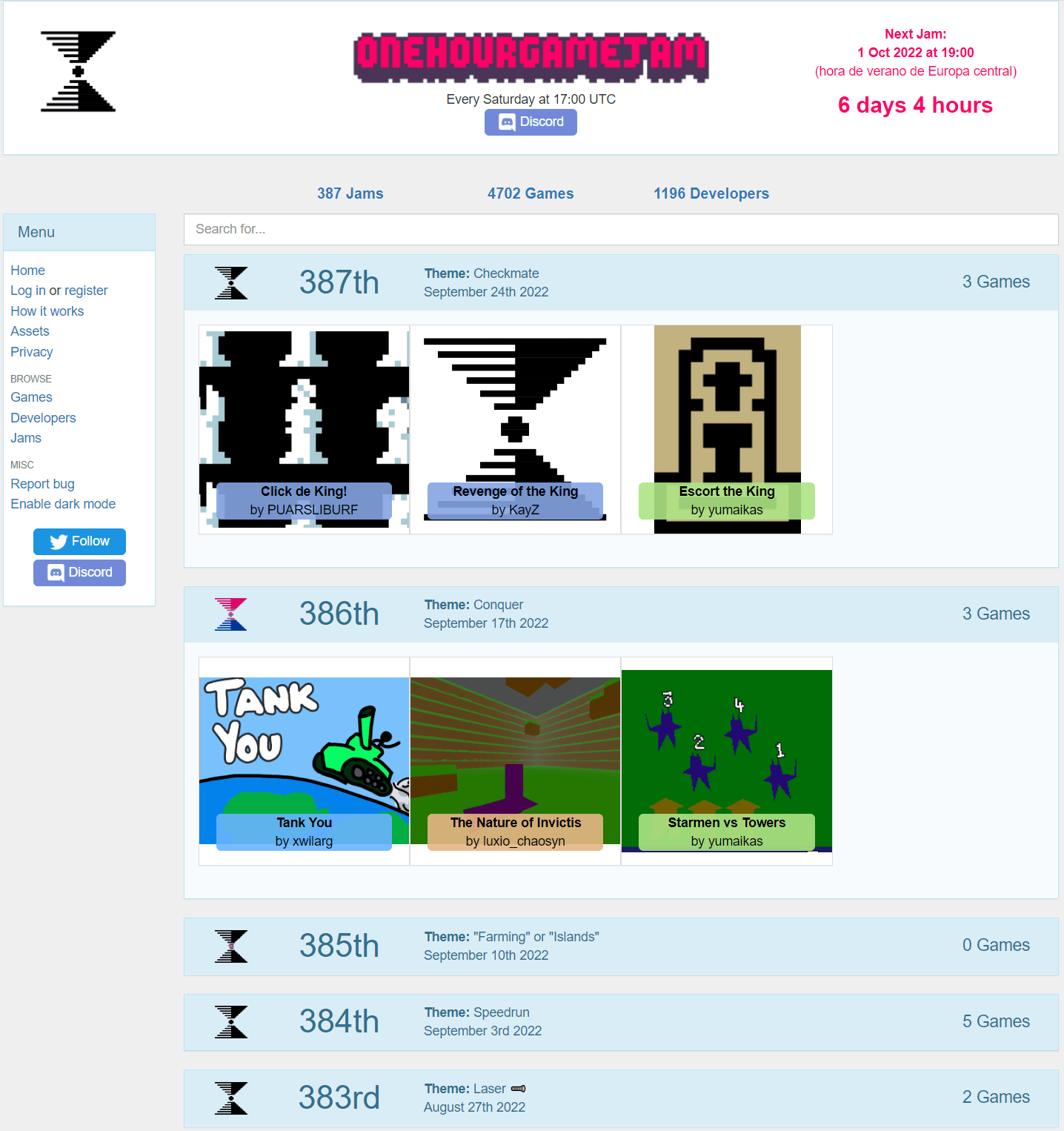
A BRIEF HISTORY OF GAME JAMS
The year was 2002 and Chris Hecker and Sean Barrett founded the world’s first video game jam.
Indie Game Jam 0, as it was later called, officially launched on March 15. Only a select group of renowned designers and programmers were invited to the jam, with the challenge to create a game on a special engine in just four days.
A month later, the first virtual game jam was launched on a forum that may be familiar to today’s jammers: Ludum Dare (Latin for “Give a game as a gift”).
The Ludum Dare community proposed a game development contest based on theme rather than technological limitations, an idea that proved so popular that the community is still holding game jams more than 20 years later.
Two of today’s most popular annual game jams, Nordic Game Jam and Global Game Jam, joined the party in 2006 and 2009 respectively.
To play or not to play?
You might be thinking about organizing your own local/remote jam, but wondering if it’s worth all the time and effort (and don’t get me wrong, running a successful jam requires some time and effort/consistency). Here’s a quick list of potential benefits from game jams:
- You are free to create games without external constraints.
- It gives you the opportunity to network with other developers.
- You can find potential collaborators for your projects.
- You will practice your game making skills.
- You can try out different roles in game making (artist, designer, programmer).
- Get feedback on your game.
- You can see how other gamemakers make games.
- It’s a chance to socialise.
- It’s an excuse to stay up late.
- You’ll have fun.
Did we mentioned the fun factor?
Making games is a lot of fun. Whether you’re a novice toy maker wondering what all the fuss is about or a veteran who’s been making toys all your life, toy making can be a lot of fun. And making games at a game jam can be even more enjoyable because you’re doing it for the sheer joy of playing.
At a game jam, there’s no pressure to make something that will sell a million copies or make much sense to the general public. It’s a great way to get back in touch with game making and try out those odd projects you wouldn’t normally consider.
Ok, you probably think this is great for the participants, but what do I get as an organiser?
That’s a good question. As a game jam organizer, you not only get the same benefits as everyone else (mentioned above), you also get other benefits. First, you get the satisfaction of giving something back to the local gaming community.
If that’s not enough, you also have the opportunity to experiment with the flavour and outcomes of your game demo by defining themes and activities within the demo. Witnessing the games produced at the end of the jam is a fantastic experience. Even better to see the games born from the jam you have organised yourself.
WHICH ARE THE MOST POPULAR GAME JAMS?
Given the number of platforms and communities that host game jamborees, you’re almost sure to find a jamboree to join any day of the year.
While it’s impossible to list all the communities that host game jams, here’s a quick summary of the most popular ones:
- Ludum Dare
- Nordic Game Jam
- Indie Game Jams
- Global Game Jam
- Game Maker’s Toolkit
- Weekly Game Jam
Itch.io has a full calendar of game jams so you can keep track of the games happening right now.
When to organise the Game Jam
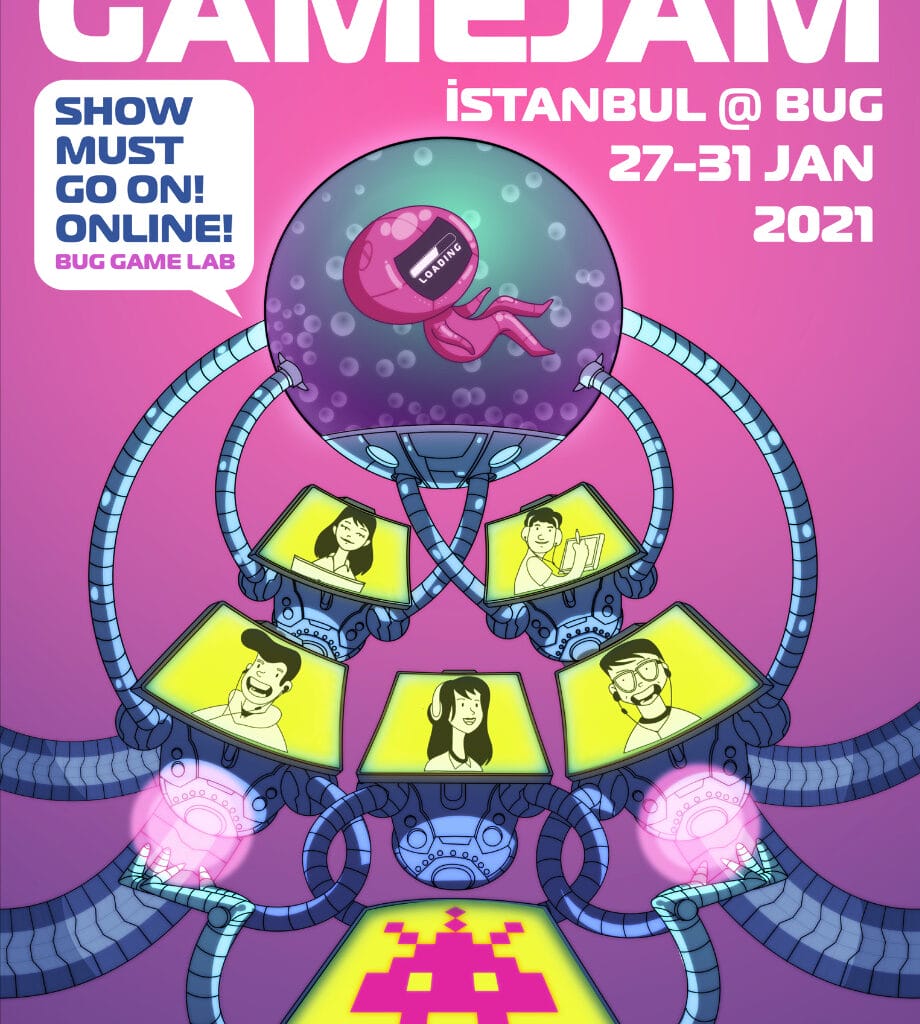
Now that you’re looking forward to starting a game jam, the first question you should ask yourself is: When should I organise this madness? You might be eager to get started and announce next weekend’s game jam, but that would be unwise.
You need to allow yourself enough time, not only to plan and organise all the details, but also to let potential participants know that they can dedicate a weekend to making the game (which isn’t always easy when you have a family and other commitments). I suggest giving people at least a month’s notice and giving yourself more time to work out your plan of attack.
Since game tournaments are usually indoor activities, you can book your tournament at any time of the year. But be aware of certain special dates and book around them to ensure good attendance:
- Highly celebrated holidays
- Dates of other popular game jamborees
- Dates of major gaming conventions
- Dates of major sporting events (don’t laugh, try to book hotels when there are home games).
The location is important

Now that you’ve got the date, you’re probably wondering: where do I put the damn thing? Finding the right place for a game jam can be tricky. When choosing a venue, there are a few things to consider: the number of potential attendees, the budget for the event, 24-hour accessibility, etc.
One option is to work with educational institutions such as community colleges, universities or vocational schools. Find schools that have courses related to games – computer science, art, game design – and contact these schools directly and ask them to host a game jam. They are often willing to do this, but there may be requirements that they have to meet. For example, you may need to employ extra security guards if you want the premises to be accessible after working hours.
Other organisations to look out for are non-profit organisations involved in technology, arts or business. In the case of many game jams, sometype of partnership with a local organisation, interested in supporting the local technology sector, could be reached and improve the overall support to the event. They usually can donate space for the jam and help promote them in the area, give some prizes for the competitors. These organisations are usually easy to find with a little internet searching or by talking to people in the industry.
If there is no organisation nearby to work with, hotels can also be a good choice for toy jams. They usually have meeting or conference rooms large enough to accommodate a decent crowd, 24-hour availability, and rooms with beds if conscience is no longer an option. The downside is that they can cost a lot of money, especially in more luxurious locations.

Dealing with Bio needs of the participantes
Providing food is not a requirement for game jams, but if it’s in the budget, it’s a welcome option. At the very least, it’s a good idea to provide snacks and drinks. If outside dining is allowed on site, you can check your local grocery store for a ready-to-eat tray of cold cuts, cheeses, crackers, fresh fruit and the like – finger foods that aren’t too messy. It’s a good idea to try to minimise the amount of cleaning you have to do afterwards.
If you choose to eat whole foods, remember that you’ll probably eat two breakfasts, two lunches and three dinners in 48 hours, depending on how you schedule things. Remember that participants may have special dietary needs, so plan for gluten-free, vegetarian or similar options.
Warning: hotels often have a “No Eating Out” policy, so if you want to provide something for your guests, you’ll have to rely on in-house catering services. Catering can be quite expensive, often the same as the cost of a room rental, so be sure to factor this into your budget. I recommend that you try to make a deal with the hotel when you book your room so that you can get a discounted rate for catering. Most of the time, businesses will make you an offer, especially if you can guarantee a good rate, and it never hurts to ask.
Funding the game jam
You may be wondering how you’re going to pay for all this. Selling jam tickets is one way to cover the costs, but finding the right amount can be difficult. You need to make sure that you charge enough to cover some of the costs, but at the same time make it attractive to potential participants
If you charge too much, people won’t pay, but if you charge too little, they will think the jam is not worth it. You have to balance correctly and analyse other game jams in your geography.
Tip: Offering early booking bonuses, such as discounted tickets or prizes, is a good way to get an early idea of how many people will be attending your event. There are plenty of online tools that have the capacity to integrate those elements into the pricing of the jam. It is recommended doing some research on these and other sites to make sure you find the right one for your needs.
A good way to fund your event is to find sponsors.
Sponsorship can come from many different sources. Many jams receives funding from schools, local gaming companies and other non-gaming related businesses. In addition to money, companies can also donate space, hardware, game development software and prizes to the jam participantes.
In return, they usually just want to be listed as a sponsor of the event and have their logo prominently displayed.
But how do you find sponsors in the first place?
Sometimes it just takes getting the word out in the local game development community. If you’re involved in a local group and have attended a few gaming events and conferences and met people there, you should have a pretty good idea of who you should talk to.
Volunteers are your friends
Organising a game jam can be a lot of work, especially if you’re trying to do it all yourself. Why not spare your health and sanity and ask for help?
Often, others are happy to help in return for a free game jam entry and a little recognition. Some people are looking for volunteer experience to boost their CV.
Game James usually are in need of dozen volunteers helping out over the course of the jam period. At least two people work at the registration desk at the entrance most days, and at least one person works the night shift.
Others help with set-up and clean-up, food distribution and whatever else is needed. Thanks to their input, the whole event runs smoothly and is a lot more fun for everyone involved.
Special features to have in account in a game jamp

Let’s see, we have a venue for the game jam, some funding, some planned food and some volunteers to help out.
But what can you do to make it a great jam?
Game Jam Topic
You need to choose a unique theme for your jam. This can be anything you like, from one-word themes like ‘Preservation’ to more abstract ideas like ‘We don’t see things as they are, we see them as we are’. (Themes help to encourage creativity by providing constraints that can inspire and challenge teams to produce fun projects that incorporate these themes.
Game Jam Keynote speakers
At the beginning of the jam, it is a good idea to bring in someone to talk about game making and get participants interested. Think of someone you know who makes games and is a good speaker, and send them an invitation. Last time, Christer “McFunkypants” Kaitila was our keynote speaker and really got the party started.
Themed Panels
It’s helpful to give participants a break from time to time during the weekend to keep them fresh. A good way to do this is to schedule some events, one of which is a panel or talk with the game makers. Popular topics include game design tips, DIY game publishing and any other topic that strikes your fancy.
Note: it may not be worth scheduling anything for Sunday, as groups are usually too focused on getting the latest features before the big reveal.
These are just a few ideas you can adopt for your own jam. Remember that anything you add will require more organisation on your part, so make sure you don’t overload yourself.
The crescento of the ending
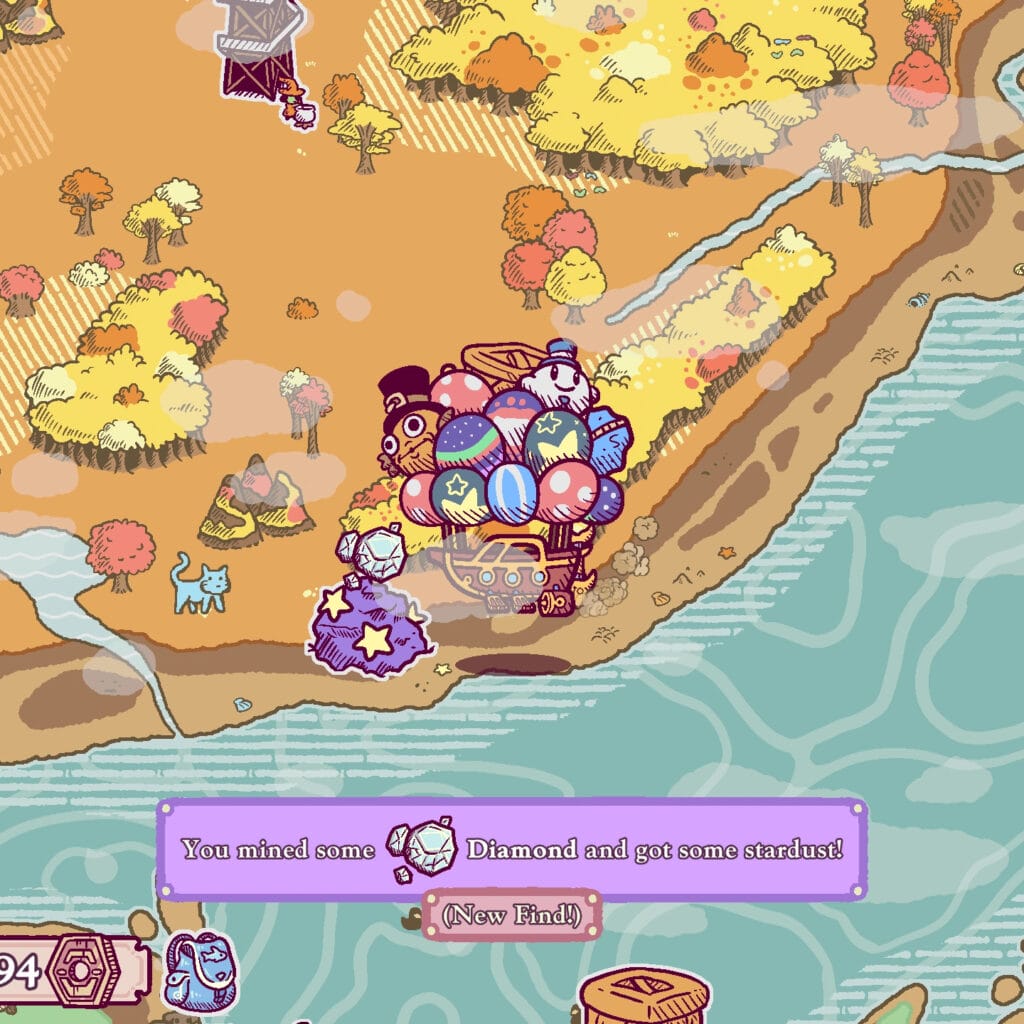
One of the best parts of the game jam is when everyone finally puts down their tools and gets ready to show off the results of their hard work. Each group should be introduced and then allowed to give a brief demonstration of their game, perhaps asking for volunteers from the audience to try out the game.
Most of the source codes are usually also published and can be a good source of learning:
Make sure you allow enough time for this as you don’t want people to feel rushed. Make sure attendees can relax, grab a bite to eat, have a beer/juice/coke, if they wanted, and watch the great games.
This is a great way to end a fun weekend.
In conclusion
So there you have it: everything you need to start your own game jam. If you have any further questions, there are plenty of resources on the internet, including established and well-known jam sites like Ludum Dare and One Hour Game Jam..
If you’re looking for a game jam to attend, we are attaching a list with the principal game jams arround the world.
Check our blog for more articles
A game developer that wants to share its knowledge and experience with other game developers-





